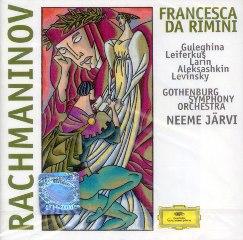Rachmaninov - Francesca da Rimini (Jarvi) [2001]
Rachmaninov - Francesca da Rimini (Jarvi) [2001]

1. Prologue: Largo - Gothenburg SO/Neeme Jarvi 2. Prologue:,Part 1: M-m.../Teper' Vstupayem Mi V Slepuyu Bezdnu - Sergei Aleksashkin/Ilya Levinsky 3. Prologue, Part 2: A-a.../Moy Sin/Kto Eti Dva, Cto Tak Legki Dlya Vetra?/Net Boleye Velikoy Skorbi V - Sergei Aleksashkin/Ilya Levinsky/Maria Guleghina/Sergei Larin 4. Tableau 1: Allegro Vivace - Gothenburg SO/Neeme Jarvi 5. Tableau 1, Scene 1: Otvet Moy Prost - Sergei Leiferkus 6. Tableau 1, Scene 2: Nicto Ne Zaglusit Revnivikh Dum/O, Yesli Bi Ti Znala - Sergei Leiferkus 7. Tableau 1, Scene 3: Moy Povelitel Zval Menya?/Lyubvi Tvoyey Khocu Ya!/Proklyat'ye! - Maria Guleghina/Sergei Leiferkus 8. Tableau 2: Moderato - Allegro Vivace - Gothenburg SO/Neeme Jarvi 9. Tableau 2, Scene 1: Prekasnaya Ginevra/Kak Dumayes, Franceska/O, Kak Im Bilo Sladostno I Zutko/... - Sergei Larin/Maria Guleghina/Sergei Leiferkus 10. Epilogue: A-a.../O, V Etot Den' Mi Bol Se Ne Citali! - Maria Guleghina/Sergei Larin Lanceotto Malatesta - Sergei Leiferkus (baritone) Paolo – Sergei Larkin (tenor) Virgil's Shade - Sergei Aleksashkin (baritone) Francesca - Maria Guleghina (soprano) Dante – Ilya Levinsky (tenor) Gothenburg Symphony Orchestra Neemi Jarvi - conductor
The idea of writing an opera about Francesca da Rimini was suggested to Rachmaninoff by Modest Tchaikovsky, brother of the more famous Pytor Illych Tchaikovsky whose orchestral work based on the same Dante passage is perhaps better known. Originally conceived as a full-length work with a libretto by Modest Tchaikovsky, its genesis was interrupted when Rachmaninoff was appointed conductor at the Bolshoi Theatre in Moscow and saw the opportunity to put on another opera he had started work on, The Miserly Knight. As The Miserly Knight was a one-act opera, Rachmaninoff needed to present a piece of similar length alongside it, to form a double bill.
Accordingly, the original plans for Francesca da Rimini were dramatically scaled down in order to allow it to perform this function. Originally, the role of Lanceotto was intended for the great Fyodor Chaliapin, which naturally led to the inclusion of more music and text for this character than there otherwise might have been, although in the event the role was not sung by Chaliapin. In consequence of these two factors, the resulting work is curiously unbalanced, which possibly explains why staged productions of this opera are few and far between, and this in turn has led to the number of recordings in the catalogue being rather limited. However, operas which do not succeed on the stage can often be enjoyed more easily on disc, and Francesca da Rimini, which has something of the feel of an orchestral tone poem with voices, falls into this category. --- musicalcriticism.com
download: uploaded yandex 4shared mediafire solidfiles mega filecloudio nornar ziddu
Zmieniony (Niedziela, 30 Marzec 2014 20:10)








